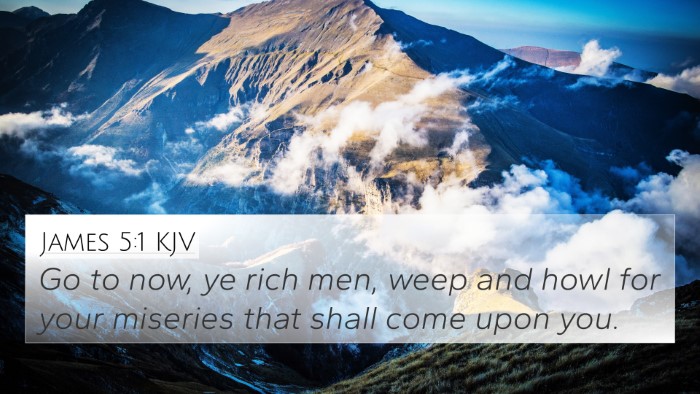Old Testament
Genesis Exodus Leviticus Numbers Deuteronomy Joshua Judges Ruth 1 Samuel 2 Samuel 1 Kings 2 Kings 1 Chronicles 2 Chronicles Ezra Nehemiah Esther Job Psalms Proverbs Ecclesiastes Song of Solomon Isaiah Jeremiah Lamentations Ezekiel Daniel Hosea Joel Amos Obadiah Jonah Micah Nahum Habakkuk Zephaniah Haggai Zechariah MalachiJames 4:13 Similar Verses
James 4:13 Cross References
Go to now, ye that say, To day or to morrow we will go into such a city, and continue there a year, and buy and sell, and get gain:
Uncover the Rich Themes and Topics of This Bible Verse
Listed below are the Bible themes associated with James 4:13. We invite you to explore each theme to gain deeper insights into the Scriptures.
James 4:13 Cross Reference Verses
This section features a detailed cross-reference designed to enrich your understanding of the Scriptures. Below, you will find carefully selected verses that echo the themes and teachings related to James 4:13 KJV. Click on any image to explore detailed analyses of related Bible verses and uncover deeper theological insights.

Proverbs 27:1 (KJV) »
Boast not thyself of to morrow; for thou knowest not what a day may bring forth.
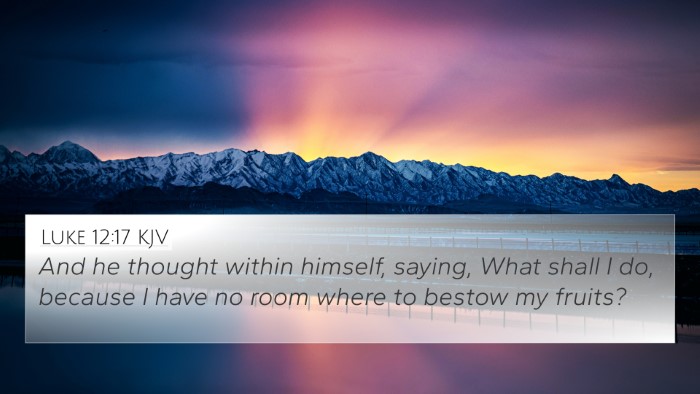
Luke 12:17 (KJV) »
And he thought within himself, saying, What shall I do, because I have no room where to bestow my fruits?
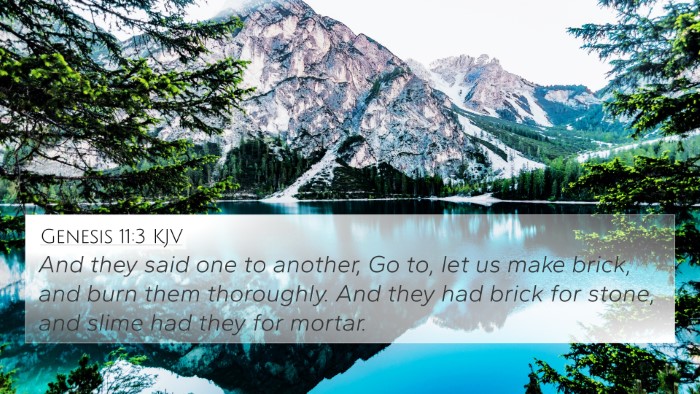
Genesis 11:3 (KJV) »
And they said one to another, Go to, let us make brick, and burn them thoroughly. And they had brick for stone, and slime had they for mortar.

Isaiah 24:2 (KJV) »
And it shall be, as with the people, so with the priest; as with the servant, so with his master; as with the maid, so with her mistress; as with the buyer, so with the seller; as with the lender, so with the borrower; as with the taker of usury, so with the giver of usury to him.
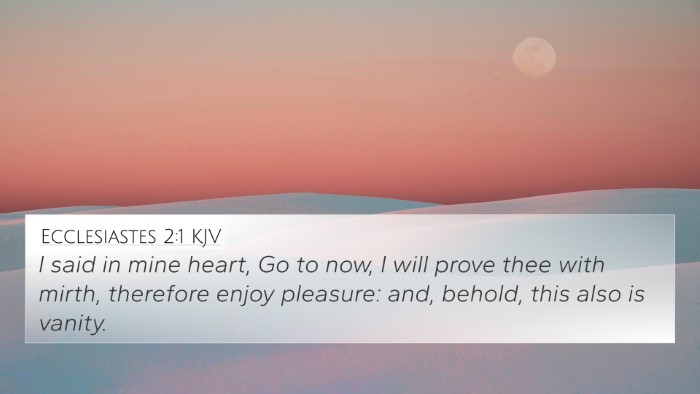
Ecclesiastes 2:1 (KJV) »
I said in mine heart, Go to now, I will prove thee with mirth, therefore enjoy pleasure: and, behold, this also is vanity.
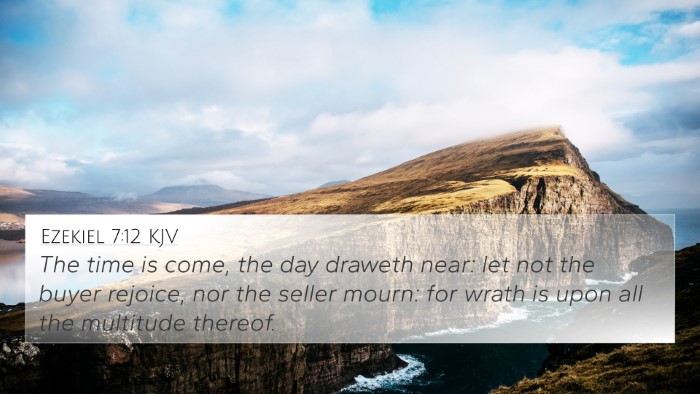
Ezekiel 7:12 (KJV) »
The time is come, the day draweth near: let not the buyer rejoice, nor the seller mourn: for wrath is upon all the multitude thereof.
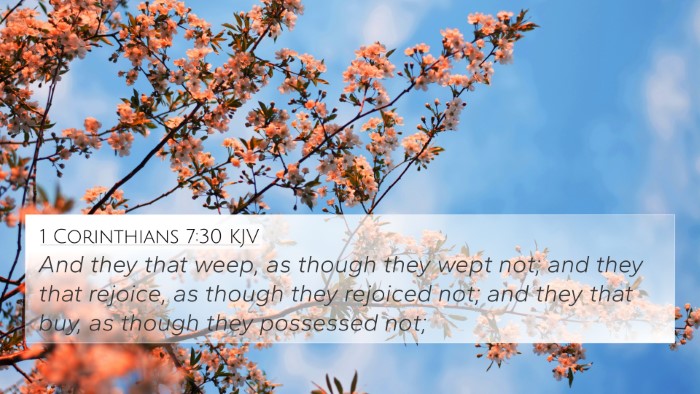
1 Corinthians 7:30 (KJV) »
And they that weep, as though they wept not; and they that rejoice, as though they rejoiced not; and they that buy, as though they possessed not;
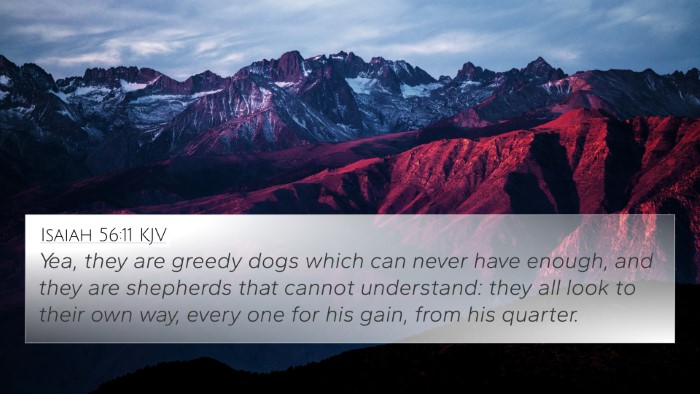
Isaiah 56:11 (KJV) »
Yea, they are greedy dogs which can never have enough, and they are shepherds that cannot understand: they all look to their own way, every one for his gain, from his quarter.
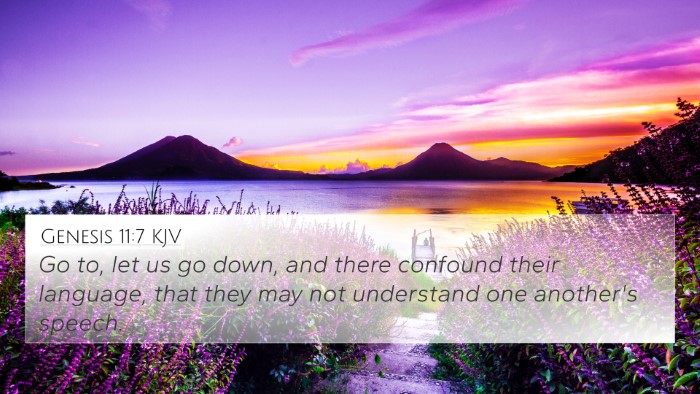
Genesis 11:7 (KJV) »
Go to, let us go down, and there confound their language, that they may not understand one another's speech.

Isaiah 5:5 (KJV) »
And now go to; I will tell you what I will do to my vineyard: I will take away the hedge thereof, and it shall be eaten up; and break down the wall thereof, and it shall be trodden down:
James 4:13 Verse Analysis and Similar Verses
Understanding James 4:13
James 4:13 states: "Go to now, ye that say, To day or to morrow we will go into such a city, and continue there a year, and buy and sell, and get gain:" This verse addresses the presumptuous nature of planning the future without considering God's sovereignty and the uncertainty of life.
The verse invites profound reflection on the human tendency to make plans ignorantly, underestimating the role of divine providence in our lives. To best understand this verse, we can explore various public domain commentaries that illuminate its meaning.
Insights from Commentaries
-
Matthew Henry's Commentary:
Henry emphasizes the folly of assuming control over future events. He notes that human life is transient, and such certainty in planning diminishes the recognition of God's authority and the unpredictability of life.
-
Albert Barnes' Notes:
Barnes elaborates on the theme of reliance on God’s will. He points to the necessity of prefacing our plans with a humble acknowledgment, saying, "If the Lord wills, we shall live and do this or that." He underlines that the future is ultimately in God’s hands.
-
Adam Clarke's Commentary:
Clarke reflects upon the cultural context of making plans. He suggests that the verse serves as a caution against pride and self-sufficiency, reminding believers to seek divine guidance in their endeavors.
Key Themes Identified
The major themes captured within this verse include:
- The Uncertainty of Life: A reminder that life is not guaranteed.
- Human Presumption: The belief that we control our destinies.
- Divine Sovereignty: Recognizing God's ultimate authority over our future.
- Humility in Planning: The need for a humble approach to daily decisions.
- The Importance of God’s Will: Acknowledging that plans must align with God's purpose.
Bible Verse Cross-References
James 4:13 connects to several other scripture passages that provide a rich context and additional insights:
- Proverbs 27:1: "Boast not thyself of tomorrow; for thou knowest not what a day may bring forth."
- Luke 12:13-21: The parable of the rich fool highlights the futility of planning without consideration of one's mortality.
- Matthew 6:34: "Take therefore no thought for the morrow: for the morrow shall take thought for the things of itself..."
- 1 Corinthians 4:19: "But I will come to you shortly, if the Lord will, and will know, not the speech of them which are puffed up, but the power."
- Proverbs 16:9: "A man's heart deviseth his way: but the Lord directeth his steps."
- Psalm 31:15: "My times are in thy hand: deliver me from the hand of mine enemies, and from them that persecute me."
- Job 14:5: "Seeing his days are determined, the number of his months are with thee, thou hast appointed his bounds that he cannot pass."
- Isaiah 46:10: "Declaring the end from the beginning, and from ancient times the things that are not yet done."
- Acts 18:21: "But bade them farewell, saying, I must by all means keep this feast that cometh in Jerusalem: but I will return again unto you, if God will."
- James 4:15: "For that ye ought to say, If the Lord will, we shall live, and do this, or that."
Cross-Referencing Biblical Texts
The exploration of James 4:13 through cross-referencing highlights the broader biblical narrative concerning human planning, divine control, and the importance of humility. Below are some techniques for effective Bible cross-referencing:
- Tools for Bible Cross-Referencing: Utilize Bible concordances and reference guides to find related themes and verses.
- Comparative Bible Verse Analysis: Compare passages to understand the multifaceted biblical approach to divine sovereignty.
- Identifying Connections: Focus on the relationships between verses that speak on God's will, our plans, and the uncertainty of life.
- Diving Deeper: Examine parallels in Old and New Testament passages to gain holistic insights.
Inter-Biblical Dialogue
By engaging in inter-Biblical dialogue, one can deepen their understanding of themes related to James 4:13. The synergies among verses help depict a comprehensive picture of God's dealings with humanity concerning foresight and dependency on His will.
Conclusion
James 4:13 serves as a humbling reminder of our finite nature and the necessity to align our plans with God's purposes. By considering the insights from various commentaries and utilizing cross-referencing techniques, believers can gain a balanced perspective that fosters faith and reliance on the Lord.



